If you’ve never brined turkey, you’ll be pleasantly surprised by the extra tender, juicy, and flavorful results you can get from this simple process. Featuring notes of citrus, fresh herbs, garlic, and brown sugar, this wet brine adds moisture and deep flavor to turkey before roasting it. As a former science teacher, I am so excited to break down the food science behind why a brine works and help you make the most flavorful Thanksgiving turkey!
After several rounds of testing, I’ve come up with an easy brine ratio that you can scale up or down depending on the size of your turkey. Plus, you’ll learn the best kind of salt to use, how you can add any aromatics and flavorings to the brine, and answer several common reader questions!
A reader says: “I put my Thanksgiving bird in a brine for 24 hours before smoking it this year. It is a WORLD of difference. It was juicy and SO flavorful. I will always brine from now on.” ★★★★★
Table of Contents
- What Is Brining?
- Why brine a turkey?
- General Wet Brine Formula
- Key Ingredients & Substitutions
- Best Salt For Brining
- What Type Of Container Should I Brine In?
- Can You Brine A Frozen Turkey?
- How Long Should You Brine A Turkey?
- FAQs To Know Before You Start
- Pro Tips For Brining Turkey
- How To Brine A Turkey
- Can I Use This Brine For Other Cuts Of Meat?
- More Thanksgiving Recipes To Try
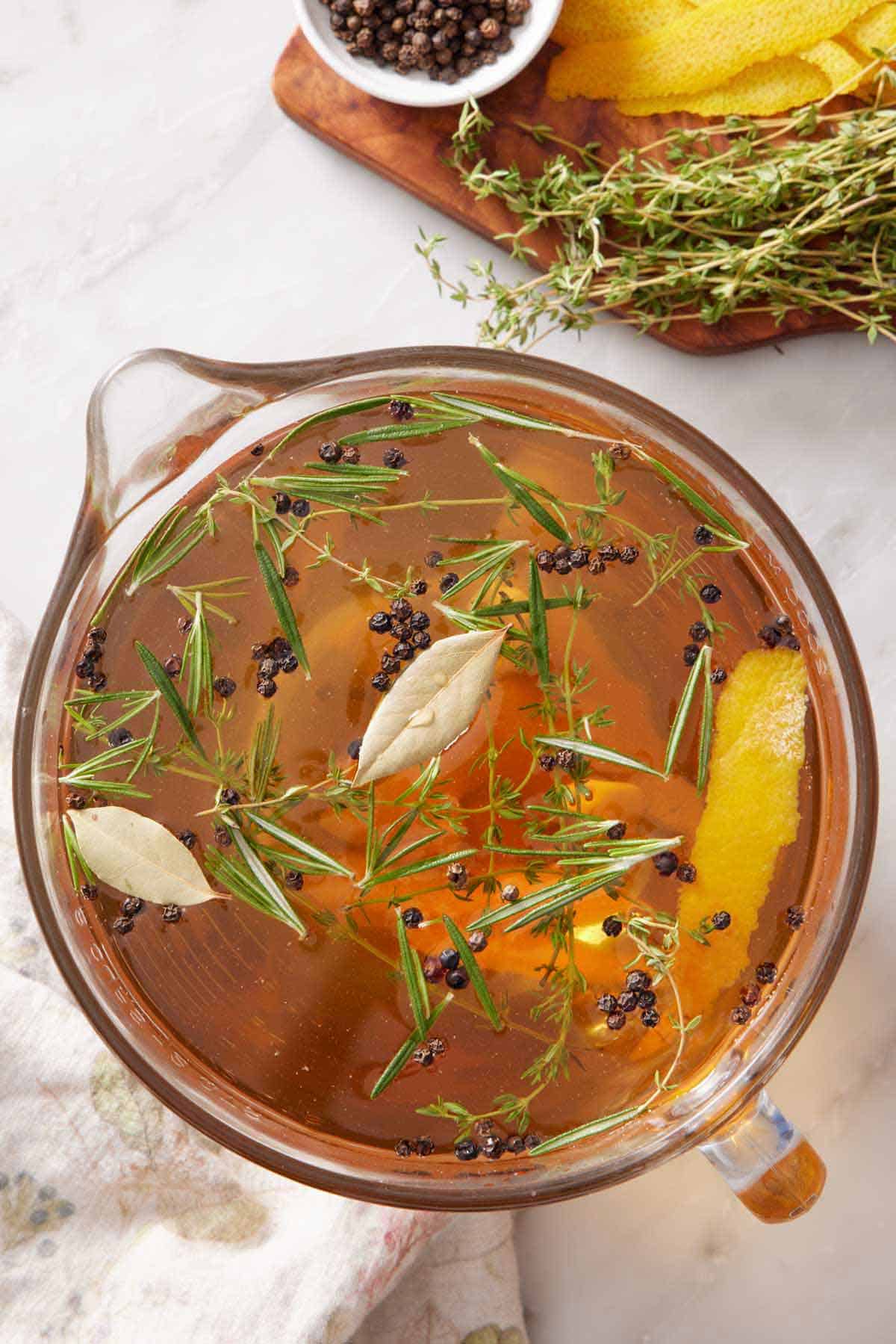
What Is Brining?
Brining is essentially marinating or soaking meat, like turkey, in a salt solution before cooking. This flavors the meat through osmosis, making the meat super juicy and tender. You can have either a dry brine (salt rubbed onto meat) or a wet brine (salt dissolved in water to soak the meat). Brines of either kind often contain other spices, herbs, or sugar to add flavor to the meat.
Why brine a turkey?
The brining process significantly enhances the meat’s taste and texture, making it more moist, tender, and flavorful after cooking. Because a turkey typically brines for many hours, it has plenty of time to soak up the flavors from the added spices.
The salt in brine actually changes the structure of the meat. It “denatures the proteins” (breaks down the cells), forming more space between the muscle fibers so it can absorb more of the wet brine. This causes the meat to hold more moisture while also tenderizing it. The result— tender, extra juicy turkey! This is a great preparation for both a classic roasted turkey and a spatchcock turkey.
General Wet Brine Formula
Knowing the basic ratios for a salt brine means you can easily scale it up or down as you need. The basic brine formula is 1 tablespoon (15g) of salt per 1 cup (240g/ml) of water. For reference, this recipe uses 1 gallon of water (16 cups) and 16 tablespoons of salt (1 cup/240g). The sugar and other seasonings are optional for added flavor and can be adjusted to suit your taste preferences.
Key Ingredients & Substitutions
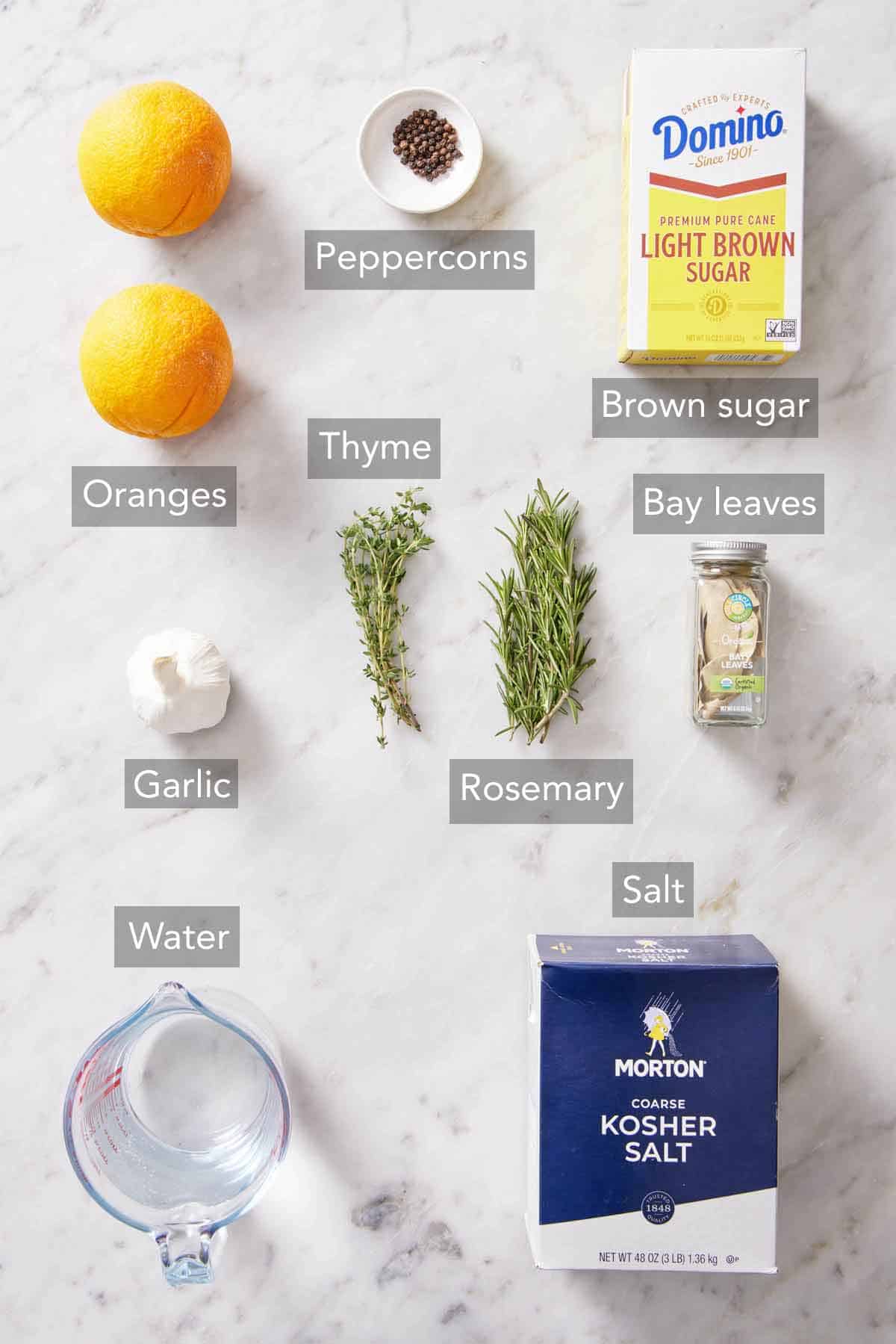
These are the main ingredients you need to make a wet turkey brine. You can find the full list of ingredients and measurements in the recipe card below.
Kosher Salt — this coarse salt is essential for even flavor distribution throughout fresh turkey. It also helps lock in moisture and tenderize the meat.
Brown Sugar — adds a hint of sweetness that complements the other savory flavors. Use light brown sugar for a lighter flavor or dark brown sugar for deeper molasses notes. Instead of brown sugar, you can also use white granulated sugar, cane sugar, maple syrup, or honey.
Orange Zest — fresh orange zest adds a citrusy, fresh burst of flavor to the turkey. Cut big strips of fresh zest off the oranges with a vegetable peeler. For a different citrus flavor, substitute the orange zest for lemon, lime, or grapefruit zest.
Herbs — a combination of fresh rosemary, thyme, and dried bay leaves adds an aromatic depth of flavor to enhance the flavorful turkey taste. You can experiment with other fresh herbs like sage, marjoram, tarragon, parsley, or oregano to suit your preferences.
Spices — whole peppercorns and fresh, smashed garlic cloves add a slightly spicy kick and robust flavor. Feel free to switch up the spices you use! Swap the garlic cloves for sliced shallots for a milder flavor. Instead of whole peppercorns, try alternative whole spices like allspice or cloves. Or, add these in addition to the garlic and peppercorns for even more flavor!
Best Salt For Brining
You might be thinking, “salt is salt,” so how is there a best one to use? While any plain salt will season your food and taste salty, there are large differences between major salt brands in terms of strength. (Yes, some salt is “saltier” than others!) This has to do with the size and density of the salt crystals. When measuring large quantities of salt, be sure to weigh it. Brands are directly interchangeable by weight but not by volume.
I use Morton’s kosher salt. The flavor is good, and it’s easy to find at any major grocery retailer. Avoid iodized salt, as it can taste bitter. Below, you can see three common types and how they vary by weight/density.
- 1 tablespoon of Morton’s kosher salt = 15g. Morton’s kosher salt crystals are smaller and denser.
- 1 tablespoon of Diamond Crystal kosher salt = 8.5g. Diamond Crystal salt crystals are hollow and lighter, so they are less salty by volume. They also crumble very easily, making the grains often appear smaller than Morton’s. (You will need 1¾ cups for this recipe.)
- 1 tablespoon of Morton’s fine sea salt = 17g. Morton’s fine sea salt has much smaller crystals. Because the salt is finer, it can pack tighter and is heavier when measured by volume. (You will need ¾ cup plus 2 tablespoons for this recipe.)
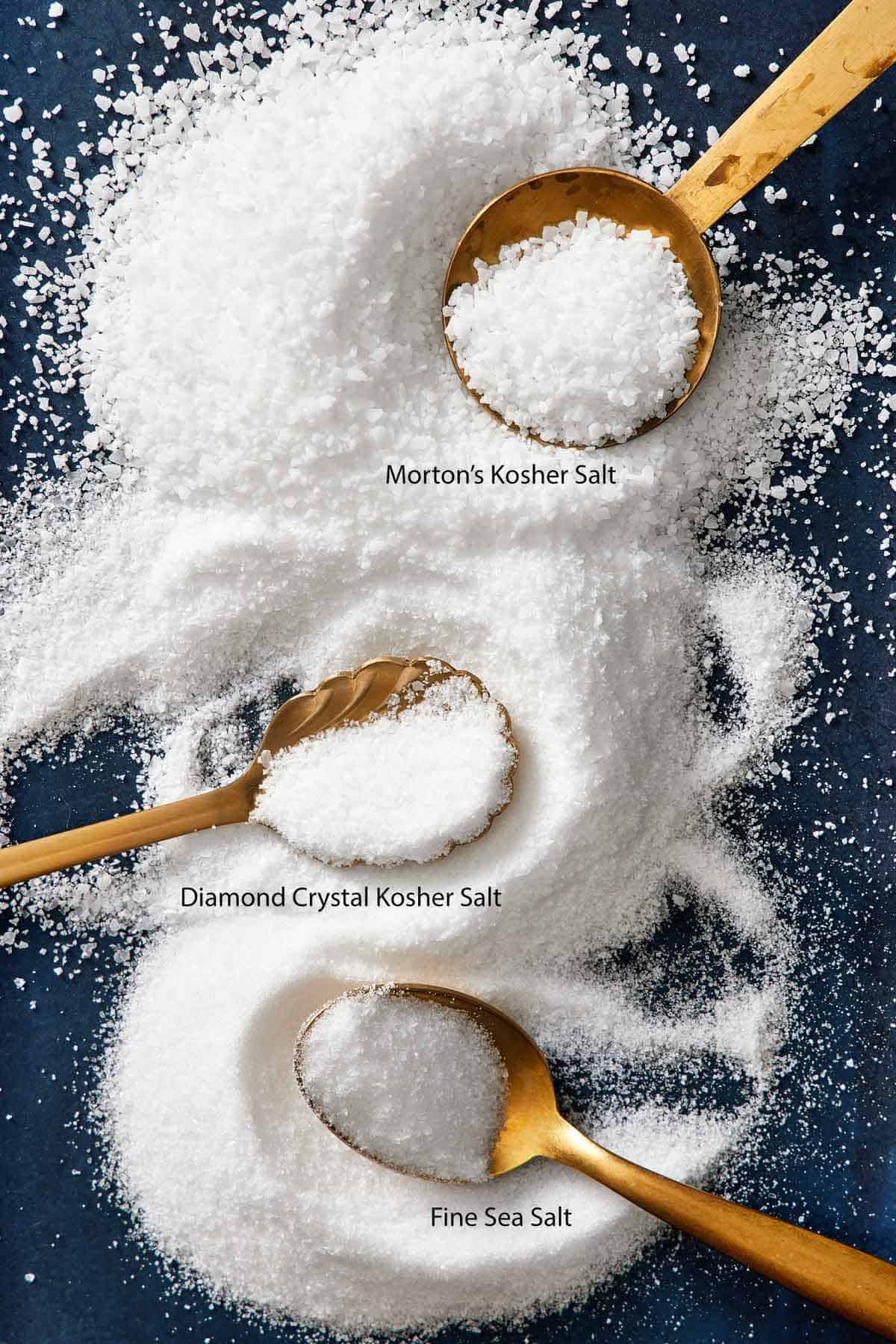
What Type Of Container Should I Brine In?
A large stainless steel or non-reactive pot that easily fits the turkey and the brine is ideal. A smaller 10-15-pound turkey usually fits well in a large stock pot. For a turkey 20 pounds or larger, consider using a clean, food-safe 5-gallon bucket or a small disposable cooler.
Alternatively, you can use a plastic turkey brining bag: place the turkey inside, pour in the brine, tie the bag to seal it tightly, then rest it in a roasting pan or a clean, large bucket to prevent leaks. Remember that the turkey must remain refrigerated during brining, so choose a container that will fit in your fridge.
Can You Brine A Frozen Turkey?
Yes, but the turkey must be thawed first for the brine to absorb properly. Thaw the turkey in the refrigerator, allowing for 24 hours for every 5 pounds of turkey.
How Long Should You Brine A Turkey?
In general, brine a whole turkey for 12 hours to 24 hours, depending on the size of the turkey.
- Smaller turkeys, about 10-12 pounds, can sit in the brine solution for 12-18 hours and be sufficient.
- Large turkeys, over 12 pounds, benefit from at least 18-24 hours for the best results.
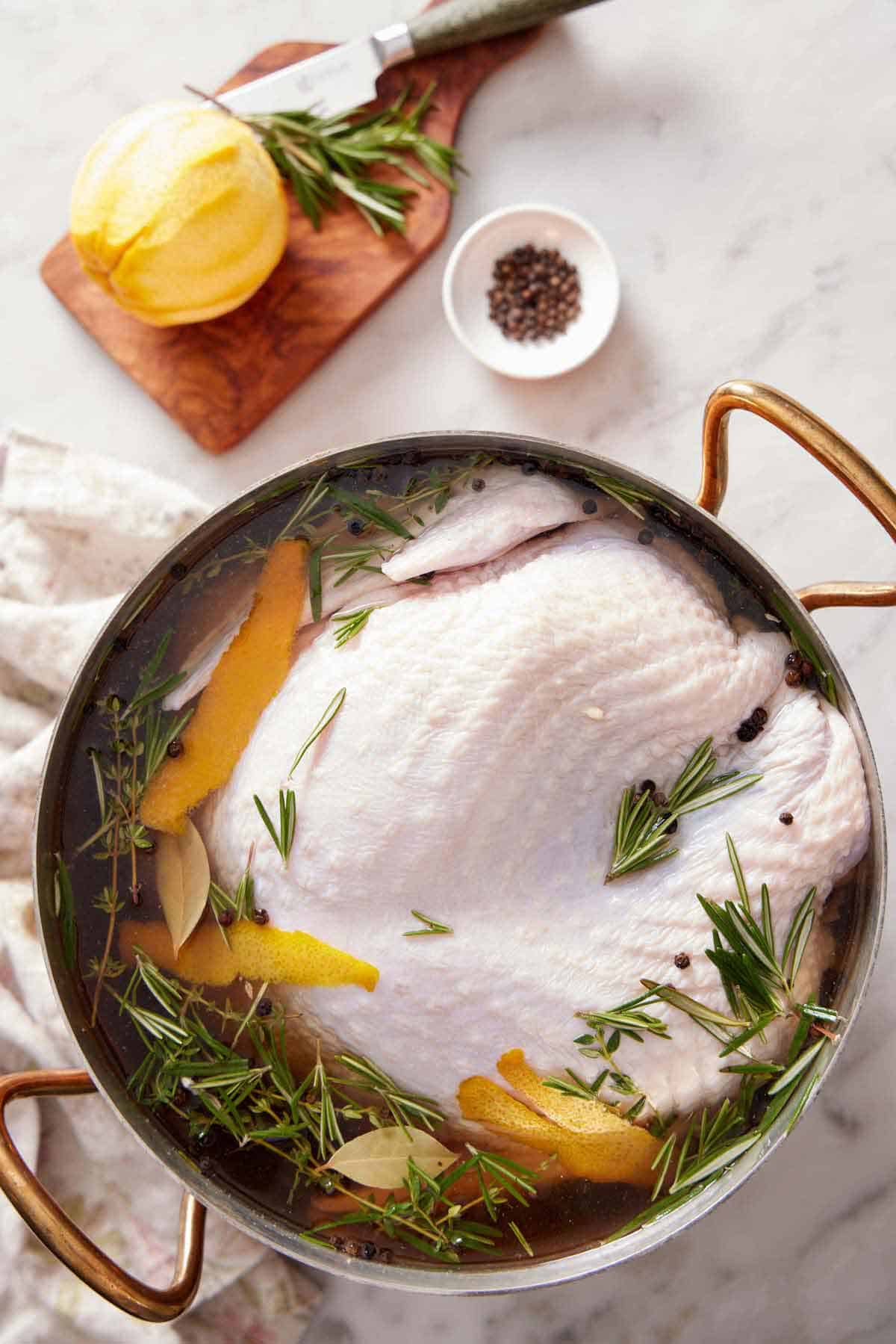
FAQs To Know Before You Start
No, I don’t recommend rinsing before or after brining the turkey. Washing the turkey can spread bacteria around your kitchen and create a big mess. Simply pat the turkey dry with paper towels and wipe away any loose herbs or spices stuck to the turkey.
No, do not reuse the turkey brine, as it is unsanitary from the raw meat and can cause foodborne illness. Toss it out after you are done.
Yes. My recipe works great for a turkey up to 14 pounds. For turkeys over 14 pounds, make an additional cup of brine for each additional 2 pounds of turkey. You can use the general brine formula mentioned above if you do not want to make the full recipe.
Pro Tips For Brining Turkey
For extra crispy turkey skin during roasting, air-dry the turkey after brining it. Refrigerate the turkey, uncovered, in the roasting pan for 12-24 hours after brining. This helps the moisture evaporate from the skin and creates a delicious crispy skin when cooked.
Add an extra flavor boost. Replace up to 3 cups of the water with apple juice or apple cider for a touch of added sweetness that complements the savory flavors.
How To Brine A Turkey
Below, I’ve highlighted portions of the recipe in step-by-step process images along with instructions for making a turkey brine. You can find the full set of instructions in the recipe card below.
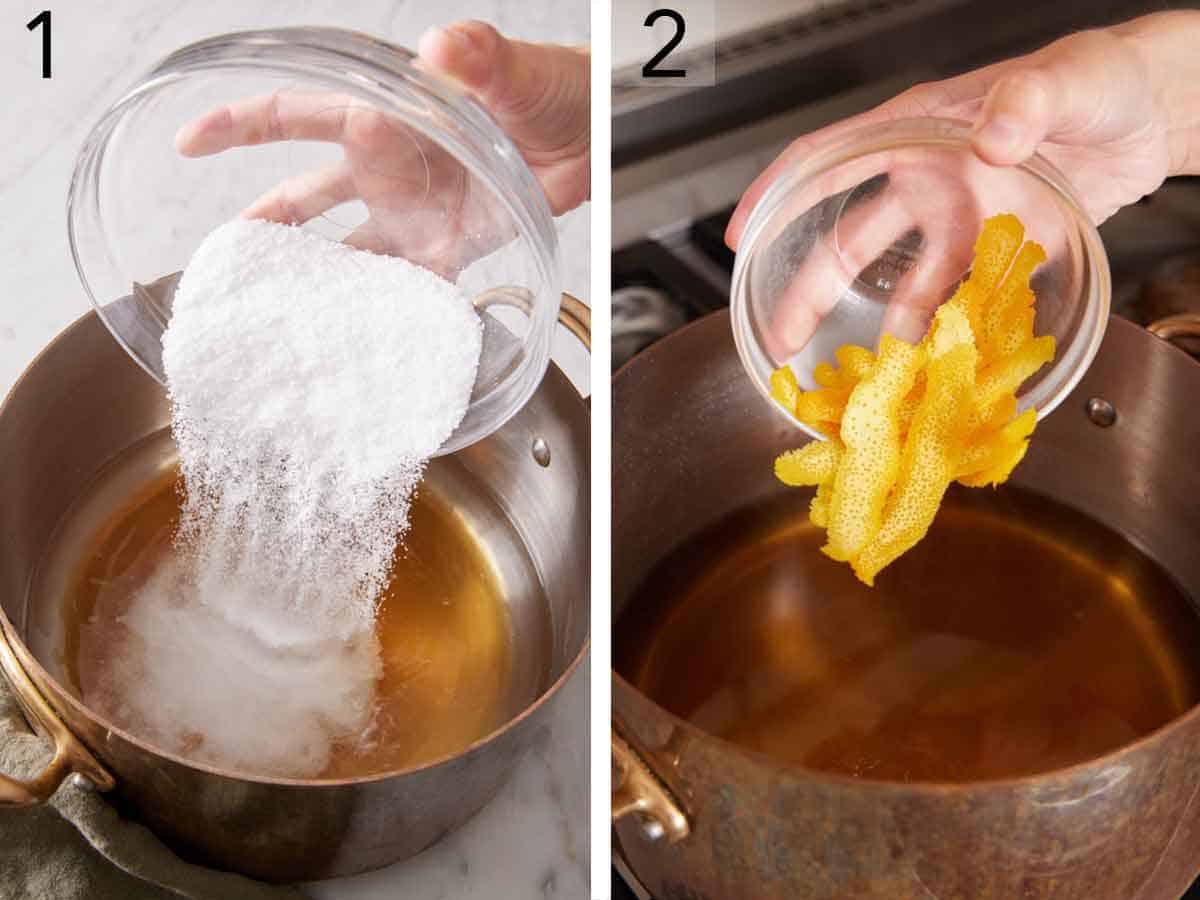
1. In a large pot, combine 4 cups of cold water, salt, and sugar. Bring the mixture to a simmer over medium-high heat, stirring occasionally, until the salt and sugar have just dissolved. Remove the pot from the heat.
2. Peel the orange zest in strips using a vegetable peeler. Reserve the zested orange for another use if desired. Add the zest to the pot.
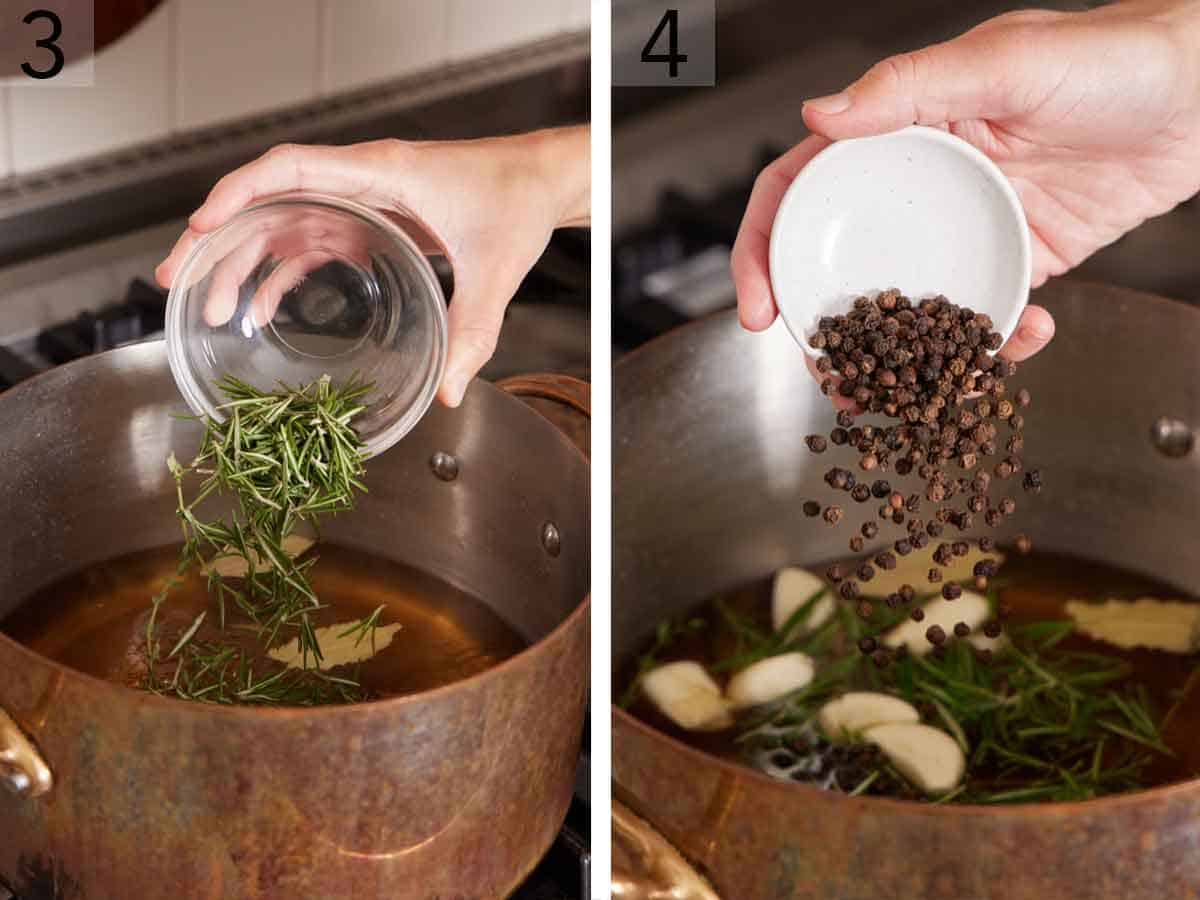
3. Add the rosemary, thyme, garlic, and bay leaves.
4. Add the peppercorns to the pot.
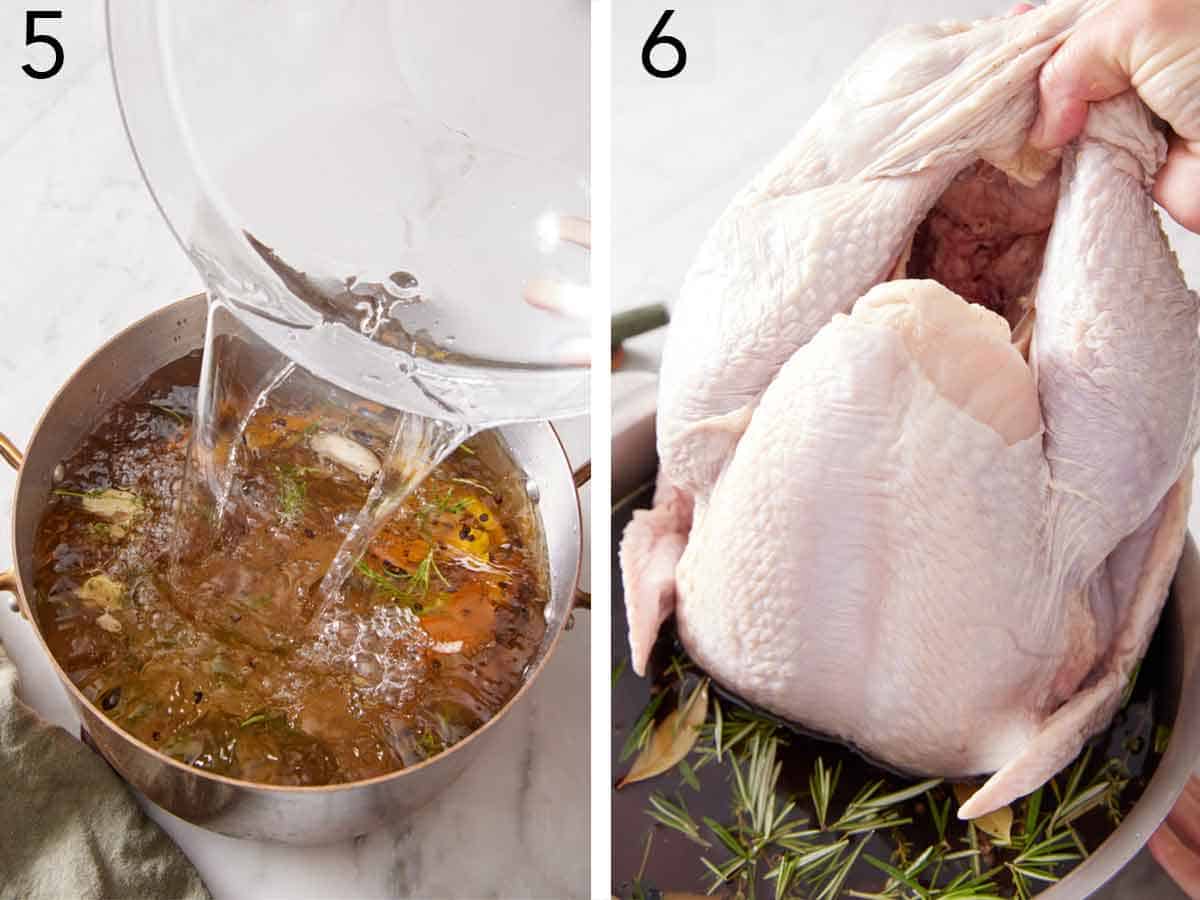
5. Stir in the remaining 12 cups of water. Let the brine cool to room temperature.
6. Submerge the turkey in the brine, or put the turkey in a large brining bag or bucket and pour the brine over the top. Cover tightly with plastic wrap or aluminum foil and refrigerate for up to 24 hours. Before roasting the turkey, remove the turkey from the brine and discard the brine. Pat the turkey dry with paper towels, and continue with your roasted turkey recipe.
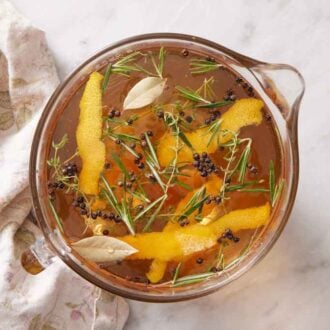
Turkey Brine Recipe
Video
Ingredients
- 1 gallon water divided (3.8L)
- 1 cup kosher salt (240g)
- ½ cup packed light or dark brown sugar (110g)
- 2 oranges
- 6 sprigs rosemary leaves removed
- 6 sprigs fresh thyme
- 6 garlic cloves smashed
- 2 bay leaves
- 2 tablespoons whole peppercorns
Instructions
- In a large pot, combine 4 cups of water, salt, and sugar. (If you have a pot big enough to fit your turkey in, use it. If not, any 4-quart pot will work.) Place over medium-high heat and bring to a simmer, stirring occasionally, just until the salt and sugar are dissolved. Remove from the heat.
- Peel the orange zest in strips using a vegetable peeler. (Reserve the zested orange for another use.) Add the zest to the pot along with the rosemary, thyme, garlic, bay leaves, and peppercorns. Stir in the remaining 12 cups of water. Let cool to room temperature.
- Submerge the turkey in the brine, or put the turkey in a large brining bag or bucket and pour the brine over the top. Cover and refrigerate for up to 24 hours.
- Before roasting, remove the turkey and discard the brine. Pat the turkey dry, and continue with cooking the turkey.
Notes
- You can make the brine in advance. If your turkey is still thawing, you can make the brine and refrigerate it for 2 days before brining your turkey. If it has been chilling for a day or two, I’d recommend straining out the spices and herbs once you are ready to brine.
Nutrition
Can I Use This Brine For Other Cuts Of Meat?
Yes! This versatile recipe also works well with pork chops, whole chicken, or chicken pieces. You can also brine smaller cuts of turkey, such as turkey breast, turkey legs or drumsticks, or turkey wings. Try it with my air fryer turkey breast, roasted chicken, or air fryer pork chop recipes!
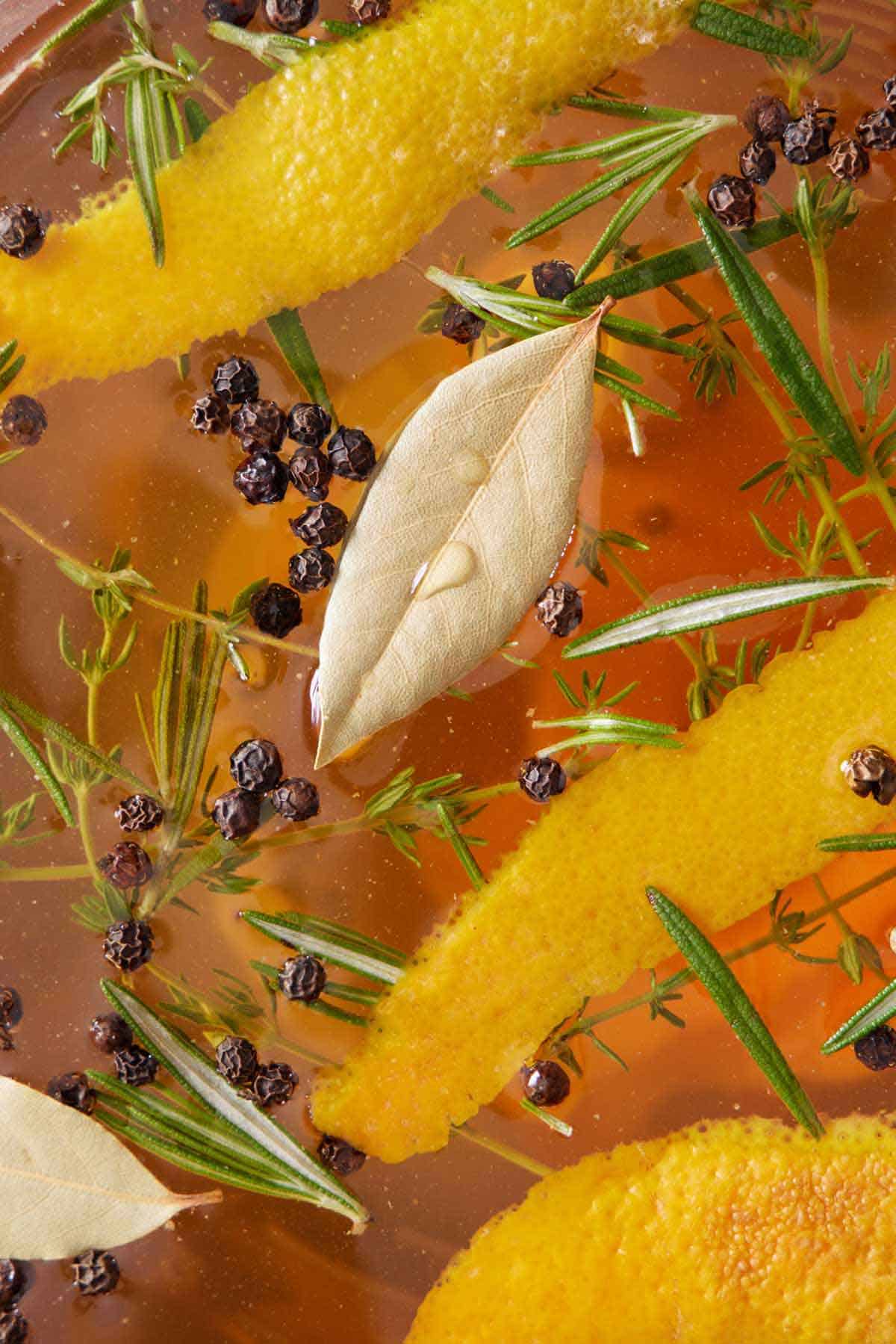
More Thanksgiving Recipes To Try
Try one of these Thanksgiving side dishes to go with your juicy turkey!
My easy smashed potatoes are an excellent, no-fuss side dish. You can even roast the potatoes whole, chill them, then smash and finish baking the next day— the perfect holiday meal prep!
A southern Thanksgiving staple, cornbread dressing is a delicious savory side dish to pair with a drizzle of turkey gravy.
Make the best mashed potatoes with my fool-proof recipe! Choose starchy potatoes like Russets and Yukon Gold for the fluffiest mashed potatoes.
A homemade gravy is so easy to make from scratch! You can use broth, stock, or drippings from your roasted turkey or chicken.
Make your holiday stuffing in a casserole dish on the side instead of stuffing the turkey cavity. Not only is it safer, but you can make a larger amount for more servings!
If you’ve tried this turkey brine recipe, then don’t forget to rate it and let me know how you got on in the comments below. I love hearing from you!



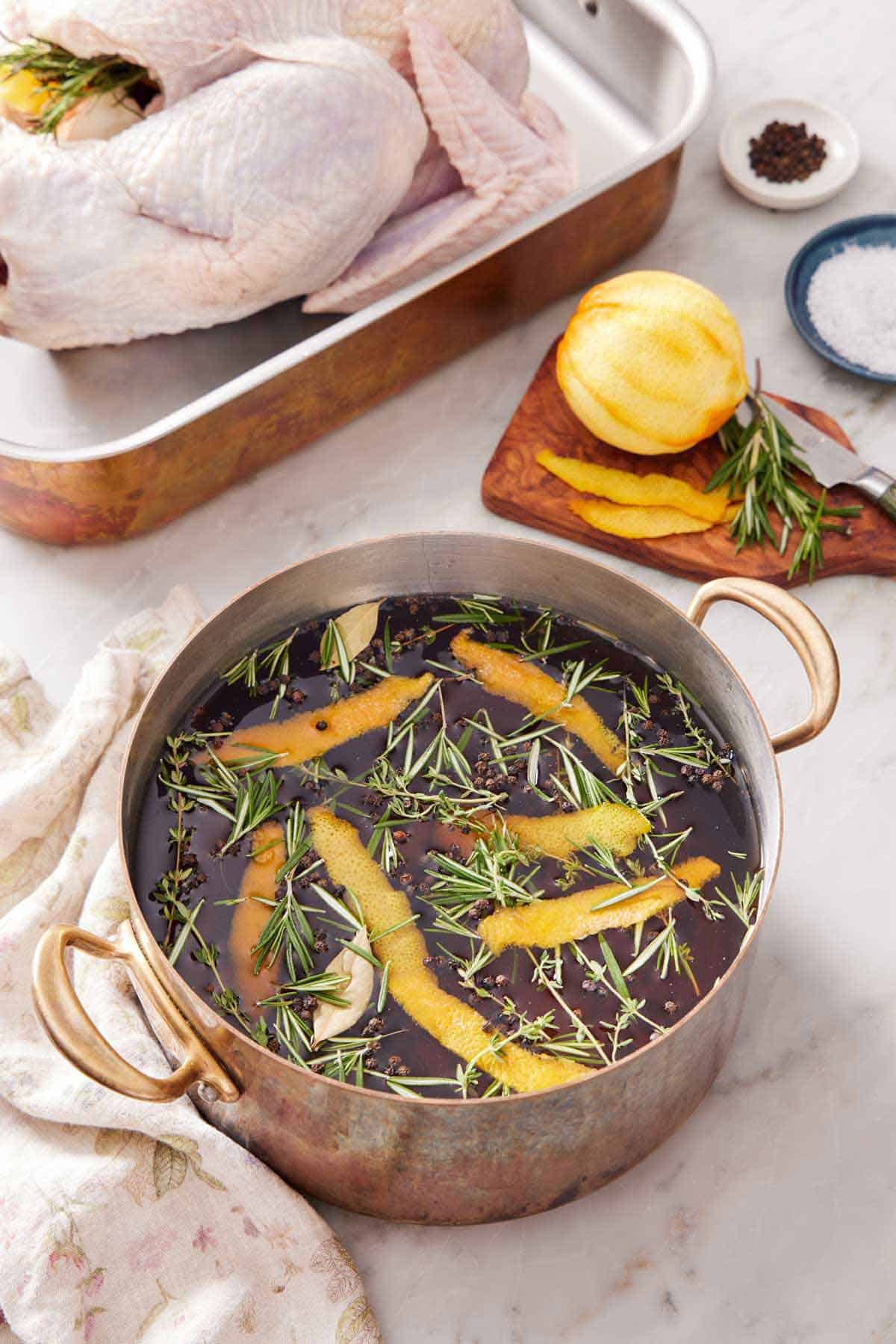

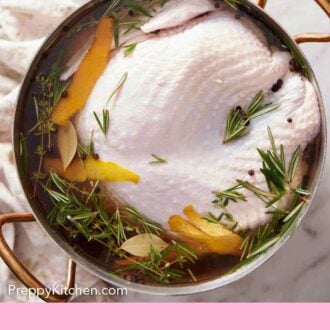

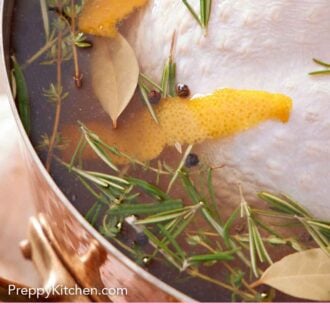
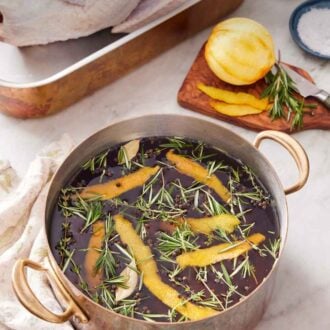
Leave a Reply